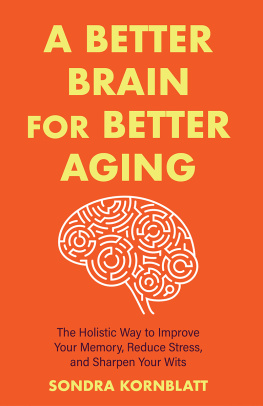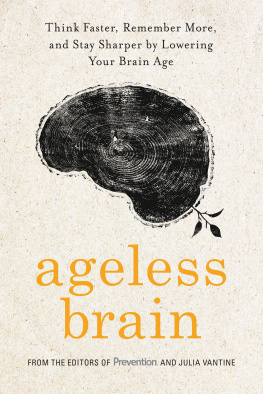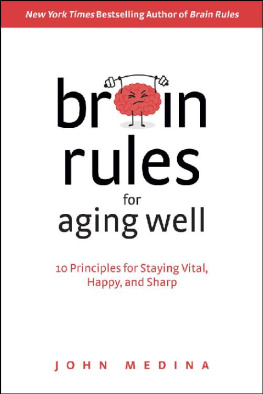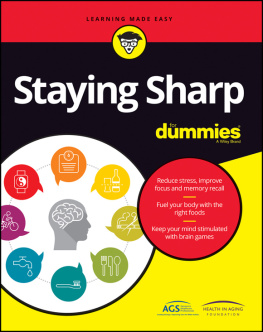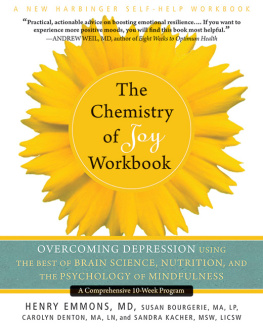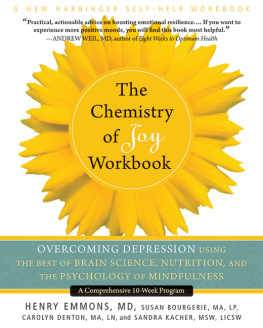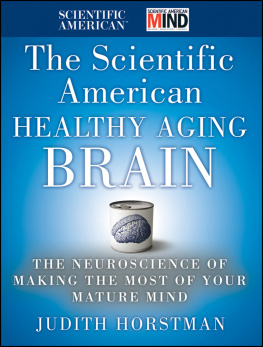Henry Emmons: To my sons, Eric and Mark, who keep me youthful, and to my wife, Jane, who keeps me real
David Alter: To my mother and father, the dual banks of love and guidance between which the current of my life continues to flow
And to Jodi, my wife, who gives that flow its energy and purpose
- 1 -
Im Too Young to Feel This Old!
You Can Create a Younger Brain and a Wiser Mind at Any Age
The Myth of Aging
Most of us cant pinpoint the exact moment we began to feel older. You know, old older. It creeps up on us, an accumulation of little details and changes, until one day we look around and find ourselves asking, almost daily:
Where did I put my keys again?
Whats the name of that restaurant I like?
When did these stairs get so steep, anyway?
Its called a... wait, I know this... its on the tip of my tongue... hang on... Ive almost remembered it...
The aches and pains we might expect. But the mental lapses can be particularly unsettling. Our imaginations go to the worst possible place Am I losing my mind? and that worry can be a constant fear for those of us in midlife (and those of us who are fast approaching it).
It is easy to understand why many see aging as a bad, even frightful thing. How often have you heard someone say something like Getting old is not for the faint of heart? We fear the physical pain and debility that we so often witness, and even more so the loss of memory and mental abilities, a loss we sometimes expect as inevitable with aging.
There is a widespread notion that the brain in particular deteriorates as we age. Conventional wisdom about aging used to be some version of this:
You are born with about 100 billion neurons. The brains development is pretty well finished by the end of childhood. Each year after the ages of six through twelve, more and more of your brain cells die off, never to be seen again. The best you can hope for is to slow down this loss of function and try to buffer the inevitable decline of aging.
Listen when we tell you: it doesnt have to be this way! These fearful losses of function are not a given. Today we understand the brain in a much deeper way than ever before, and we now know how to change the brain in positive ways. For example, while it may be true that there is a loss of neurons as we get older, we now also know that the brain has stem cells that can replace some of those lost cells. In fact, the brain is remarkably resilient at repairing itselfeven after something as damaging as a stroke! Neuroscience is teaching us some of the ways we can support that resilience, and we will share those findings with you throughout this book.
Yet there is more than just the hope of slowing our decline. There are ways in which aging is actually full of possibility, because our brains are always able to learn and our minds are continually capable of gaining wisdom. Those abilities can enhance our lives, even as we lose a few neurons along the way.
It is our premise that aging itself is neither good nor bad. We all encounter aging no matter what we do, so long as we are fortunate to live long enough. The question is not will we age, but how will we engage the aging process? In Staying Sharp , youll learn techniques for facing the challenges of the second half of life with excitement instead of dread. Youll discover tools for maintaining a healthier brain, skills for enhancing wisdom, and practices that will help you live every day with a more joyful heart. Read on!
Can I Really Feel Better at This Point in My Life?
Helens story is like so many others we hear in our practice. Now that she was in her late fifties, her brain didnt seem as sharp as it used to. She described herself as mentally fuzzy, having trouble remembering things that she used to recall quickly and effortlessly. Her mood had been affected too, so that she was more easily frustrated and quicker to anger. A growing list of physical ailments, though none were serious, had eroded her naturally high levels of energy and optimism, leaving her feeling exhausted and depleted. She concluded her story with a statement that was part despair and part defiance: I am more than this. Yet having tried the conventional medical routes to no avail, shed begun to wonder, Will I ever improve, or is this just what I have to accept as an inevitable part of aging?
While you cannot stop yourself from aging, the good news is that the kind of decline that Helen described is neither normal nor inevitable, and you can have a lot of influence on the quality of your own aging process. Helen found that by practicing just a few of the exercises that youll learn about in this book, she began to emerge from the mental torpor shed found herself in. After several weeks, she felt sharper, the mental fog had lifted, and she was able to regain a sense of control and contentment in her life. It happened to Helen, and it can happen to you too.
This clarity emerges when we learn how to align ourselves with the natural way the brain is designed to work. The brain will simply express what it is in the habit of expressing. When the mind is focused with positive intentions and grows through life-affirming practices, the positive aspects of the mind that are lying dormant can evolve into new and joyful habits. Becoming more vitally alive, feeling sharper and more mentally focused, and even awakening joy, is easier than you think.
An East-Meets-West Approach
So how can you optimize your brain to maintain (or even further develop) your mental acuity? You can combine cutting-edge advances in neuroscience with ageless healing practices that have been keeping humans healthy for millennia. And thats where our unique backgrounds come into play.
I am Henry Emmons, MD, and I practice as an integrative (holistic) psychiatrist. As I neared the end of my medical training nearly thirty years ago, I chose to become a psychiatrist because it seemed like the natural path to understanding and embracing the whole personbody, mind, heart, and soul. But while I was leaning toward wholeness, the field of psychiatry was becoming more and more reductionist, often focused on the brain (and a few brain chemicals) to the exclusion of heart, soul, or even the rest of the body! Early in my career, I realized that practicing psychiatry in this way wasnt good for my patients or me. I had to find another way.
I was always more interested in health than disease, so I refocused my attention on what makes people healthier and happier, including the daily choices we make to care for our bodies; how we relate to our minds and their myriad thoughts and emotions; and the degree to which our hearts are alive and able to embrace all that life offers, both good and bad. This led me to study, in earnest, the fields of integrative nutrition, lifestyle medicine, ayurvedic medicine, and mindfulness practice. Neuroscience has been a natural way to tie all these disciplines together.
Over the last fifteen years, with Partners in Resilience, I have worked to weave together these disparate fields into coherent programs to help people recover from all-too-common mental health problems, without relying upon medication. My earlier books, The Chemistry of Joy and The Chemistry of Calm , describe in detail these programs for depression and anxiety, respectively. Blending Western science with Eastern wisdom, they help take the mystery out of good mental health and offer clear road maps that go beyond mere recovery from illness toward a more vital and joyful life. With Staying Sharp , we aim to do the same with aginghonor all aspects of what it means to be human, while blending the emerging field of neuroscience with the tried-and-true practice of mindfulness. We wish to help you not just to get by with more intact neurons but to actually grow happier and wiser as you also grow older.
Next page

